Why Working from Home Means Working Smart
My not-so-hot take on the New Normal that is remote work
Have you heard about the Nymbix “work from home” controversy? The one where their employees say that “working from home makes you dumb” “working from home encourages laziness and complacency” and so on?
It’s one of the [many] hot topics on Filipino social media recently, and with good reason.
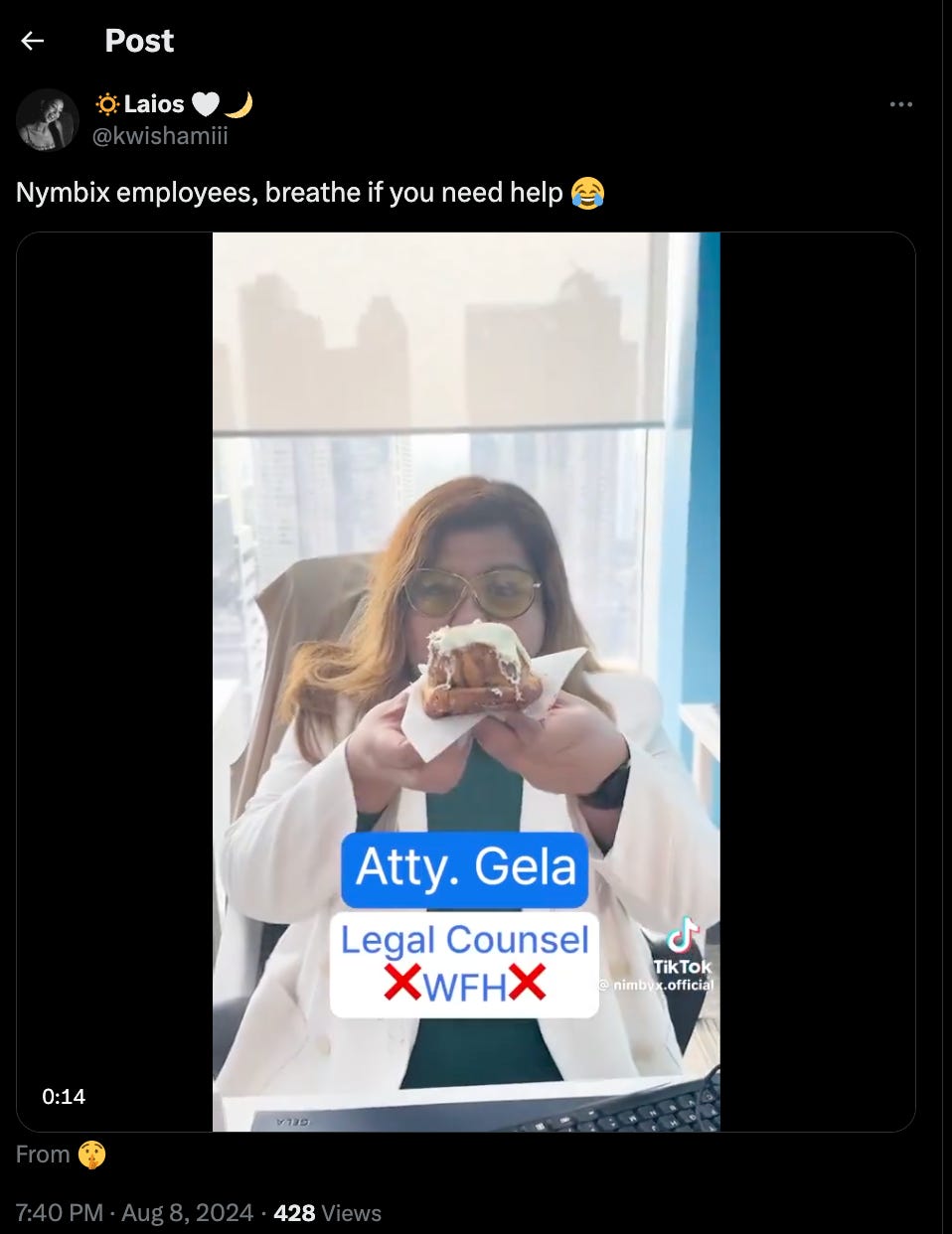
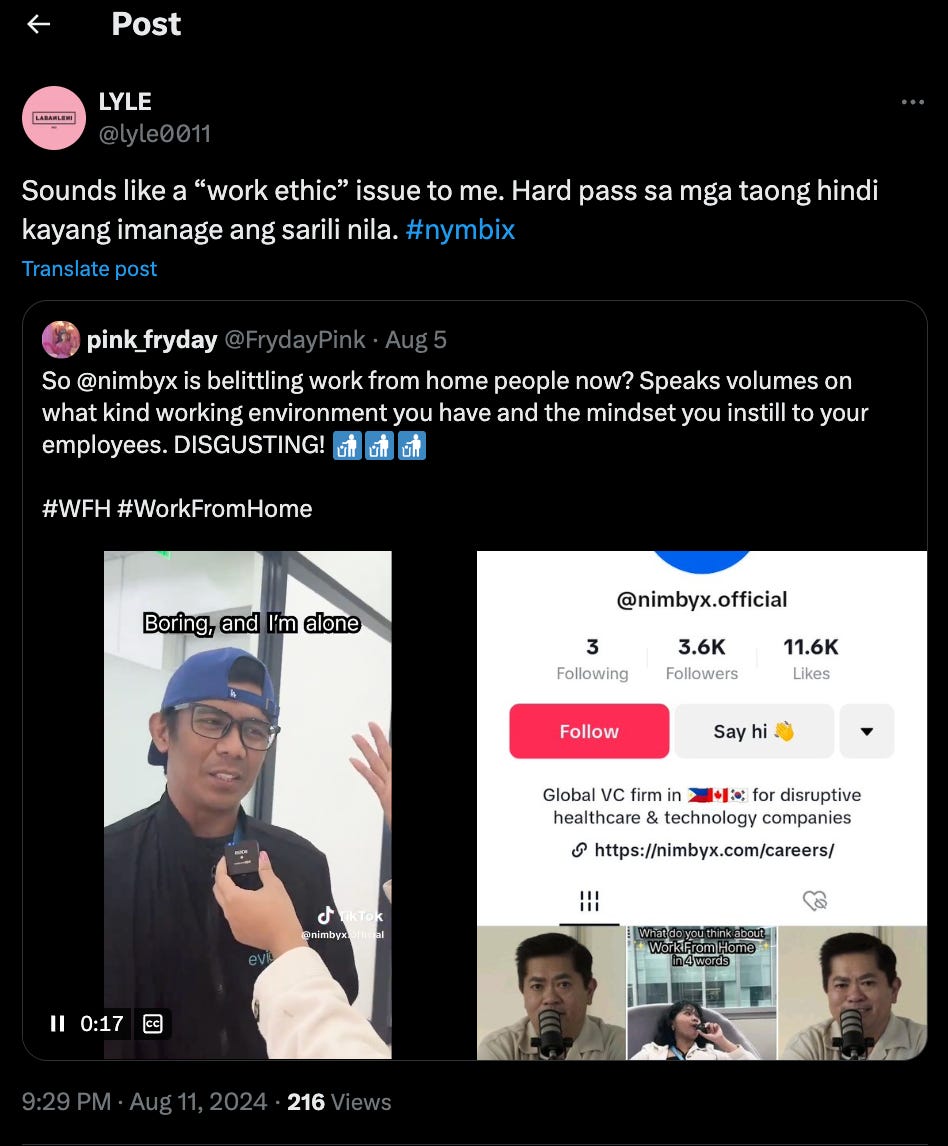
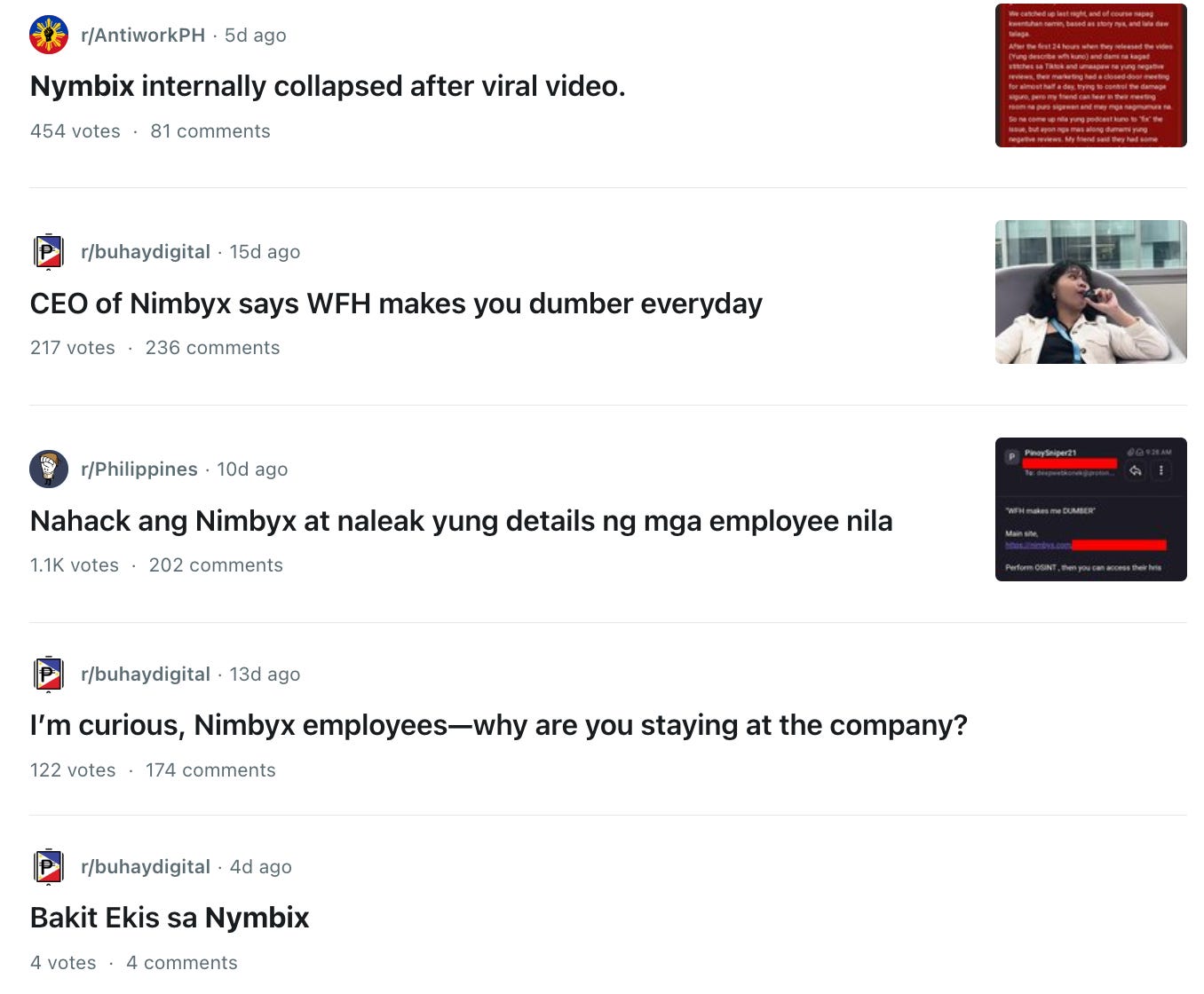
I experienced working on-site back in the pre-pandemic days. But for the past four years, I have been writing copy from home - because of the pandemic, and because of the setup of my current employer (we do have occasional face-to-face client meetings and company events).
Because of this, I wanted to share my take on the sitch: working from home is a smart choice, if managers and employees are smart about it.
I started working in the mid-2010s. My first two offices were in Makati (a city that’s 23km away from where I live, and 2-3 hours commute each way). That’s because most ad agencies that I knew of were located there. Remote work wasn’t as prevalent yet, and I didn’t have the portfolio nor the confidence to market myself to a foreign boss.
Honestly, I learned a lot from on-site experiences. Navigating a different city, interacting with all sorts of people, and experiencing the dynamics of my first few jobs in-person (including shoots, events, brainstorming sessions, overtime dinners, etc.).
But don’t get me wrong - it was hard.
A day in the life of a copywriter working on-site
Back then, I’d wake up early, do chores and get ready quickly, then leave for work just as the sun was coming up.
I’d walk to hail a tricycle, get on a bus (or a UV express, then a train, then a jeep) before walking a few blocks to my office.
Since I worked in advertising, even if the official hours were from 9-6, I’d usually get out around 8 PM, 7 if I was fortunate. Dinner was fast-food or convenience store food eaten at my desk while I worked overtime.
Once I was out, I’d wait half an hour to get on a bus home, usually with standing room only.
By the time I got home at around 10 or 11 PM, my family was asleep. I’d wash up, scroll a bit on my phone, and then go to bed - preparing to do the same thing again the next day.
I got no quality time with my loved ones except on weekends. And any time for hobbies had to be done during the weekends, or lunch break, or on the ride home. I’d have the occasional dinner out with my boyfriend, but with that quality time came quality fatigue once I got home. Sigh.
The grit and perseverance needed to do all that - especially when the pay isn’t exactly high - is wild.
I loved what I was doing, though, and I was willing to put in the work if it meant training and a portfolio.
But also, I didn’t have a family to support, I wasn’t assigned bills to pay, and I had two healthy parents and a sibling who could help out at home.

In short, back then, there wasn’t really anything I was risking — except my own quality of life. Which, surrounded by people who were the same as me - I thought wasn’t all that bad. Lol.
Eventually, I moved to a company closer to home. Still 100% on-site, but I got to enjoy a bit more time at home, time with my boyfriend and friends at work, while still crafting good copy for several brands. A better deal, I must say!

And that was the job I left right before I started working from home.
2020: The year of so many transitions
Right before COVID hit, I was transitioning out of my old job while finishing my first and only semester of a Master’s degree.
Alongside the global pandemic, my family was having our own health crisis - my dad had cancer, and my mom was being diagnosed with cancer. My sister was a medical student at the time, and I was again, transitioning out of my current job.
During that era of face shields, poor government response, zero public transport, paranoia about our finances and health, I was just so thankful that I was in a line of work that could be done from home. I wasn’t laid off. I could work and look for gigs. I could upskill. And I could do it with little risk to my family. What a blessing!
Because I was able to work from home, I could pitch in logistically and financially. I even managed to accompany my mom for her surgery, help with house repairs, manage an emergency pet care situation, and upgrade my personal laptop — all thanks to the remote work opportunities available.
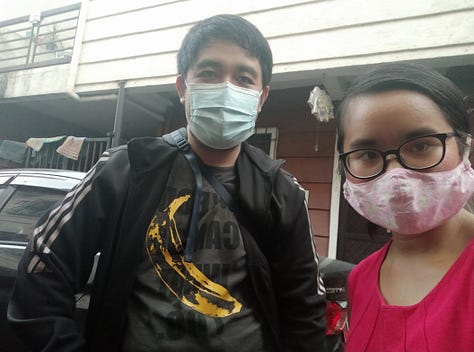
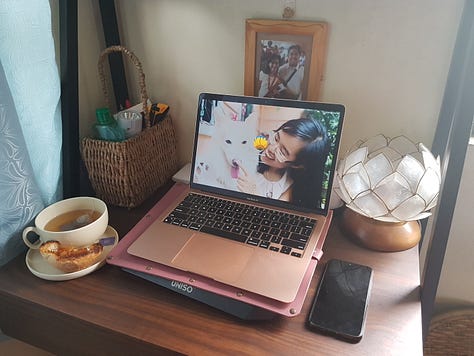

It was astounding just how productive I could be when working remotely. And well, how productive I needed to be.
My dad eventually passed, my sister went back to on-site med school and internship, and I had to be the main housekeeper, furmom, and caregiver for my mom.
Thanks to remote work, I learned to make even better use of my time. I could walk the dogs, garden, and eat breakfast before clocking in. I could fold clothes, exercise, do the dishes, pay bills over lunch break or after work. And after dinner, I could work on my hobbies, journal, and just rest.
Instead of spending a fortune on transportation, I was putting my money to better use. Remote work let me help my mom out with her medication, buy better food for the dogs, and enjoy a little bit of my own earnings.
Eventually, I found that I was taking better care of myself, and therefore better care of those around me - something that would be impossible if I were working somewhere that required on-site appearances every day.
Adapting to work from home = having good work ethic
Now, I’m not dismissing the merits of on-site work. I went to school 100% on-site. My first three jobs, 100% on-site. But I don’t know what the impact on work ethics would be on those who never ever experienced on-site school/work (like if I had kids to raise, a team to lead).
Still, no way would I just shoot it down and chalk it up to “Remote work makes you dumb.” “Kids are softies because of remote work.” “You’re not really working the way I define work if it’s not in a cubicle and you’re commuting 4-6 hours a day.”
But in the same way that we appreciate progress from typewriters to Microsoft Word, why can’t we appreciate the leaps and bounds we as a society can make through remote work?
Why can’t we focus on developing good values, training individuals, and becoming good leaders in the era of remote work? Why can’t we enable and empower ways to work to live, instead of glorifying living to work?
It doesn’t take a lot of imagination or empathy to see what working from home can do:
Think of the decreased motor traffic and carbon footprint - especially in traffic-burdened Metro Manila.
Think of the improvement and enrichment of the kids whose parents will be able to raise them hands-on, without worrying about affording childcare or looking for relatives who can watch them.
Think of the increased productivity and mental well-being of a career-driven yuppie who has to take care of ailing parents and household chores, but needs to work full-time (me!).
Think of the seasoned managers who still want to work, but might be saddled with concerns like health, fatigue from commuting, and so on (my mom!).
Remote work entails significant adjustment and adaptation especially since things like work culture, mentorship, and learning & development will have to be taken from cubicles to computers. But it’s an investment in yourself and your team.
And look. I’m not saying all work should be done remotely. That’s just not possible for surgeons, carpenters, farmers, taxi drivers. But when and where it is appropriate, I think it should be worth exploring.
That said, working remotely is a privilege and therefore, a responsibility. We’re being paid to work and trusted to deliver even while off-site. So as an employee, I think it’s important to comply with reasonable protocols for logging in/out, meeting deadlines, showing up for and participating in calls, and so on.
Note that this doesn’t mean employers and managers should expect their employees to be on-call because they’re “at home.” Nor should their overtime go unpaid, just because they’re doing it from their bedroom. Poor management and unfair work policies are still poor and unfair, whether done on-site or remotely. And even work-from-home employees can get burned out if there is no boundary between work and life.
On the other hand, I know of some people who are close to abusing this privilege. For example, going ‘AFK’ (away from keyboard) for non-emergencies and leaving their teammates in a lurch. Making their “vacation” a priority during a “workcation” (while the rest struggle to beat deadlines).
My beef with people who do this is that it hurts those of us who do have priorities and emergencies. For example, I might need to receive a delivery of my mom’s medication. Or someone may need to take a sick pet to the vet.
Sloppy behavior like the ones I mentioned above might put the hard-earned trust and privilege I enjoy at risk, and I hate that!
We’re already so blessed to be able to do what we love from the comfort of home (or anywhere). Let’s show the naysayers (at Nymbix and elsewhere): Work from home doesn’t make us dumb or lazy — because we’re being smart about it.
What’s your take on working from home vs. working on-site? What’s your current work setup, and what do you love best/least about it? Let’s discuss in the comments!
Buhay Copywriter by Regina Peralta is free today.
But if you enjoyed this post, I’d love it if you would:
💌 Share this post with a friend or two. It helps grow our little community, plus your friends get all the cool insights and lessons you got from this newsletter, too!
💰 Send a tip via my Ko-fi account or my Buy Me a Coffee account. This supports more than just my craft - it helps me support my mom, who’s been battling ovarian cancer for four years. You can learn more about it on my Project R Instagram account. Any amount helps, and is very much appreciated.
🙏🏽 Also, it would mean a lot if you could include my cancer warrior mom in your intentions/manifestations/prayers. Writing this newsletter is actually one of my “sanity checks” during this trying time; Mommy’s been battling the disease for 4 years now. That said, if I suddenly don’t check in with you for a while, please know that this little community of 200+ is in my thoughts, and I will get back to you once my head, heart, and hands can manage to do so again.











My husband works from home, which is fortunate because I’m disabled and he can work around his schedule to take me to appointments.